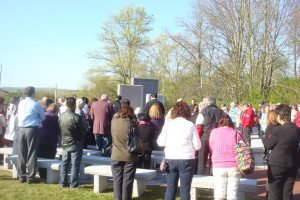CHELMSFORD, Mass.—A display of 11.9 million grains of rice, representing the lives of the various ethnic groups lost in the Great Holocaust during World War II, was one of the moving artworks displayed at the second annual Interfaith Service Against Genocide, co-hosted by Sts. Vartanantz Armenian Church in Chelmsford and the Greater Lowell Interfaith Leadership Alliance (GLILA). Muslims, Jews, Orthodox Christians, Catholics, Protestants, non-denominational Christians, and Buddhists were all invited to hold a handful of rice in their palm, pause, reflect, and stand together against genocide in all forms. The rice, weighing 525 pounds, was later donated to the Pine Street Inn, a homeless shelter serving the Greater Boston Community.

Prior to the service, approximately 80 people viewed a documentary on the Armenian Genocide, which detailed the horrific story of the mass murder of 1.5 million Armenian men, women, and children during World War I by the Young Turk government. The one-hour film was at times difficult to watch, as many present were in disbelief of the misery and suffering experienced during the genocide. “I never realized that an event with such devastation ever befell the Armenian population in Turkey,” remarked Dr. Stephen Fisher, a spiritual psychologist and member of GLILA sub-committee responsible for planning the event.
Deacon Ara Jeknavorian of Sts. Vartanantz Church began the Interfaith Service by noting that the joint commemoration of genocides and tragic events with a massive loss of lives began last year with a vision by Rabbi Dawn Rose of the Temple Emmanuel in Lowell, who wished to expand the annual Holocaust Remembrance Day to include all ethnic groups that have suffered some form of genocide. Jeknavorian remarked that this extension to other ethnic groups was to emphasize the understanding that man’s inhumanity to man has no geographic or historical boundaries. Furthermore, the healing within our own ethnic experiences can be complimented through better understanding of each other’s genocide experience and its aftermath.
Welcoming remarks were offered by Farook Taufik, co-president of GLILA and representing the Islamic Society of Greater Lowell, and Rev. Fr. Khachatur Kesablyan, the pastor of Sts. Vartanantz Armenian Church. Father Khachatur expressed his heartfelt appreciation to GLILA for the opportunity to host this second annual commemorative event, as well as the opportunity to allow the Armenian community to share firsthand the continued pain caused by the Armenian Genocide. He further commented on how this commemorative event has brought the general community together to pray for healing and initiate a call for action against future genocides.
The interfaith service then proceeded with five presentations from various victim groups. Representing a relatively unknown American Indian group, the Miknak tribe of Vermont, was “grandma” Judy, a tribal elder who described forced sterilization of the female tribe members in order to eliminate indigenous native populations during the 20th century.
A remembrance of the Cambodian Genocide was expressed by Niem Nay-Kret, a bilingual, bi-cultural behavioral field specialist specializing in healing for genocide survivors; Ven. Sao Khon, president of the Lowell Community of Khmer Buddhist Monks; and Brandon W. Eang, a graphic design teacher at Westford Academy, who provided an eyewitness account of the mass murder of innocent Cambodian citizens. Prayers were also for victims of the Cambodian Genocide.
Rabbi Dawn Rose, along with congregants from the Temple Emanuel of Lowell, offered prayers and the chant “Ani Maamin” (“I believe”) in remembrance of the Jewish Holocaust. Some 70 labor concentration camps were cited, where over 4.3 million Jews and other ethnic groups were murdered.
Ryuoh Faulconer, Shonin, Nichiren Buddhist Sangha of Greater New England, Ryusho Jeffus, Shonin, Myosho Temple, North Carolina, and Kairen Warren chanted prayers for the tragic deaths resulting from the atomic bombings in Hiroshima and Nagasaki.
Deacon Jeknavorian began the presentation on the Armenian Genocide by highlighting that the absence of recognition and justice has been a contributing factor for subsequent genocides. ACYOA member Sam Balian, a member of the church’s youth group, offered a reflection on the responsibility of today’s youth to honor the memory of the Armenian martyrs by taking on the responsibility of demanding recognition from Turkey. Father Khachatur, deacons, and the choir then conducted a Requiem Service praying for the souls of all victims of genocide.
The entire congregation sang a verse of “Der Voghormya” (“Lord Have Mercy”) chant following each presentation as a unified expression of healing for each victim group.
The inter-faith program concluded with a prayer and the laying of carnations by the Armenian Genocide Memorial on the church’s plaza. A reception followed in the Kazanjian Pavilion, where numerous brochures and information tables were available for those seeking further information about genocide issues.


Be the first to comment